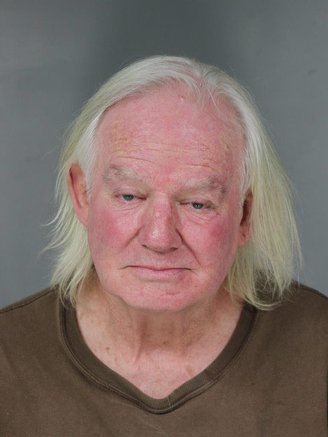About two weeks before David Alan Kobak shot his good friend Fred Loftus to death, Loftus sent Kobak expletive-laden, angry texts.
“Who the fuck makes you better than me, you fucking fuck?” Loftus texted Kobak on Aug. 8, 2017. Another text threatened “This could be your last day.”
Kobak’s response: “I’m cooking dinner, Fred. Don’t be rude.”

Kobak.
Interviewed after being arrested for Loftus’s death, Kobak told Senior Detective Ron Harpham that the two discussed the exchange later and laughed about it.
On Aug. 25, 2017, the two longtime friends spent hours drinking at Ernie’s bar, then walked about 13 blocks to Kobak’s apartment on Seventh Street. Kobak told Harpham they had a good time walking home.
Yet shortly afterward, the then 75-year-old Kobak picked up his semiautomatic rifle and fired at Loftus 10 times, with 8 bullets striking Loftus.
Kobak told the detective Loftus had hit him in the mouth “two or three times, maybe more,” yet photographs show no redness or swelling on his face. And Kobak claimed the 59-year-old Loftus said something terrible to him, but he wouldn’t say what it was.
Now Kobak is in front of a jury, charged with first-degree murder and faced with life in prison if convicted.
During his cross-examination of Harpham on Wednesday, Deputy Public Defender Casey Russo suggested Kobak was extremely drunk and under high stress when he fired the weapon. Russo also questioned whether Kobak was still drunk and in a state of shock when the detective interviewed him.
Harpham agreed with Russo that people under the influence of alcohol can have problems with memory, judgment and motor skills. They can be confused and disoriented.
He also agreed it’s possible to be “blacked-out” drunk and yet walking, talking and acting normally. Yet later the person will have no memory of what happened during the blackout.
Russo said during his opening statement that Kobak does not remember the shooting. But Kobak told Harpham that Loftus made him angry and “I shot him.”
Harpham, who has 29 years of law enforcement experience, said he would not have interviewed Kobak if he suspected he was drunk or in a state of shock. As shown on a videotape played for the jury, Kobak was able to stand up, take off his T-shirt and put it back on. Although he constantly interrupted the interview with exclamations of “I fucked up” and “I’m sorry,” he answered most of the questions he was asked.
A little over an hour after the killing, Kobak’s blood alcohol level was .16. Loftus’s blood was not tested for alcohol.
Russo also suggested Kobak may have been suffering from age-related memory problems. He sometimes responded with “I don’t know.”
For example “I don’t know if (Loftus) threatened me. He just wasn’t cool about the whole situation. We were buddies.”
Russo seemed incredulous that police hadn’t interviewed the bartender at Ernie’s, where Kobak and Loftus spent several hours drinking. Harpham said that as the shooting happened later and in Kobak’s apartment, he didn’t think the bartender was relevant.
Loftus’s personal property, which was not seized as evidence, contained several prescription medications. None were tested to determine their effects when combined with alcohol.
Testimony was expected to continue this morning before Judge Gregory Elvine-Kreis.
###
PREVIOUSLY:
- EPD: 75-Year-Old Man Arrested for Murder After Calling Police to Report Fatal Shooting
- UPDATE: EPD Releases More Information on Last Night’s Fatal Shooting on 7th Street
- Elderly Eureka Man Pleads Not Guilty to Murdering His Roommate; Bail Increased to $2 Million for Suspect in Friday Night Shooting
- Hearing Delayed in the Case of Elderly Eureka Man Accused of Shooting His Roomate to Death
- Hearing Date Set for Eureka Man Accused of Murdering Roommate Before Calling Cops
- ANOTHER CONTINUANCE: Eureka Man Accused of Killing Roommate Has Preliminary Hearing Postponed
- 75-Year-Old Eureka Man Will Be Tried for Murder of Roommate, Judge Rules
- TODAY in COURT: Four-Year-Old Arcata Murder Case Delayed; Two-Year-Old Eureka Murder Case Also Delayed; Two-Year-Old Orick Murder Case Set for Trial
- Eureka Roommate Murder Trial Opens; Victim Shot Eight Times Following Day of Drinking and an Unrepeatable Insult, Say Lawyers
CLICK TO MANAGE